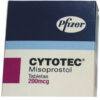Medication Description
Florinef, generically known as fludrocortisone acetate, belongs to the class of medications called corticosteroids. It mimics hormones naturally produced by the adrenal glands. The primary role of Florinef is to help with maintaining adequate salt retention in the body, thus contributing to maintaining the blood pressure and electrolyte balance. It is typically used in small doses to avoid potential complications associated with steroid use.
Pharmacological Properties
Fludrocortisone acetate functions as a synthetic adrenocortical steroid with potent mineralocorticoid properties. The drug primarily acts on the distal renal tubules to enhance sodium reabsorption and promote potassium excretion. These effects arise from its interaction with intracellular receptors and subsequent modifications in protein synthesis. Florinef’s pharmacokinetics involves oral absorption, hepatic metabolism, and renal excretion.
Therapeutic Indications
Florinef is used to treat conditions such as Addison’s disease and adrenogenital syndrome. In Addison’s disease, the body does not produce enough steroid hormones, and Florinef helps replenish the deficit. The medication is also prescribed in cases of congenital adrenal hyperplasia where it alleviates symptoms by maintaining sodium balance. Furthermore, it is sometimes used in cases of hyporeninemic hypoaldosteronism.
Recommended Dosage
Florinef is commonly administered in a dosage of 0.1 mg per day. However, the exact dose may be adjusted based on individual needs and the specific condition being treated. For some patients, especially those with salt-losing forms of the illness, up to 0.2 mg may be necessary. Monitoring by healthcare professionals is crucial for dose adjustments based on blood pressure, electrolyte levels, and overall health status.
Administration Guidelines
The medication is primarily available in oral tablet form. It should be taken with or without food, depending on the healthcare provider’s instructions. It is essential to adhere to the prescribed schedule to maintain a consistent therapeutic effect. Missed doses should be taken as soon as remembered unless it is close to the time of the next dose. Avoid doubling doses, as this can lead to adverse reactions.
Storage Instructions
Florinef should be stored at room temperature, away from excess heat and moisture. Avoid placing it in bathrooms or places with an increased likelihood of humidity. The medication should be kept in its original container with the lid tightly closed. Ensure that the medication is out of reach and sight of children to prevent accidental ingestion.
Possible Drug Interactions
Florinef has the potential to interact with various substances, affecting its efficacy or increasing side effects. Potassium-depleting diuretics may enhance hypokalemia risks when used with Florinef. Nonsteroidal anti-inflammatory drugs could increase blood pressure, requiring monitoring. Concomitant use with insulin or oral hypoglycemic agents might necessitate dosage adjustments due to potential changes in blood sugar levels.
Management of Side Effects
Patients may experience side effects such as fluid retention, increased blood pressure, or hypokalemia. Regular monitoring and consultation with a healthcare provider can help in managing these conditions. Dosage adjustments or additional medications can be employed to mitigate adverse effects. If experiencing unusual fatigue, severe edema, or significant mood changes, medical attention should be sought promptly.
Patient Monitoring Parameters
Regular follow-up with healthcare professionals is necessary when on Florinef. Monitoring parameters include blood pressure, serum electrolytes (sodium and potassium), and renal function. Assessment of fluid retention signs and the overall efficacy of the treatment is also vital. Adjustments in therapy may be needed based on these evaluations to ensure optimal outcomes.
Pregnancy and Lactation Considerations
While on Florinef therapy, patients who are pregnant or planning to become pregnant should discuss potential risks and benefits with their healthcare provider. The medication may have implications on fetal development. Furthermore, since it might be excreted in breast milk, caution is advised when used by breastfeeding mothers. Alternative treatments should be considered where possible.
Special Population Usage
Patients with hepatic or renal impairments should use Florinef cautiously, with potential dosage adjustments. Elderly individuals might experience heightened sensitivity to corticosteroids, warranting vigilance. Pediatric applications require careful consideration of benefits versus risks, often necessitating specialist involvement. Continuous evaluation by healthcare professionals is crucial in these populations.







Reviews
There are no reviews yet.